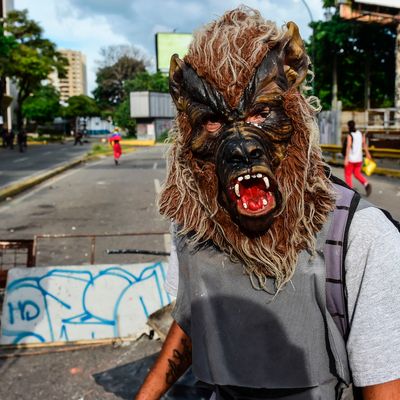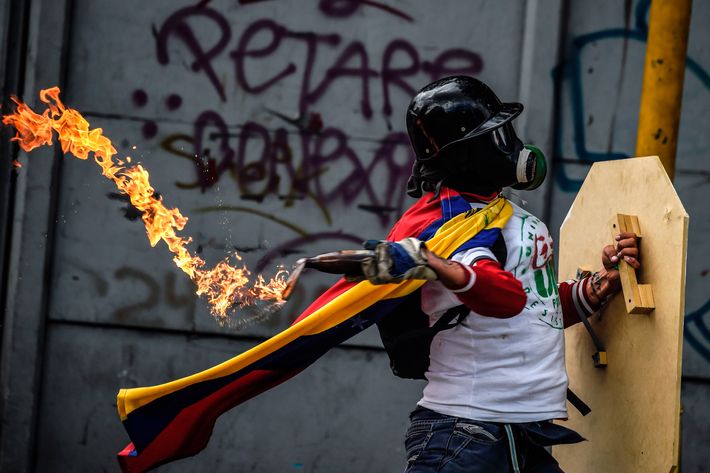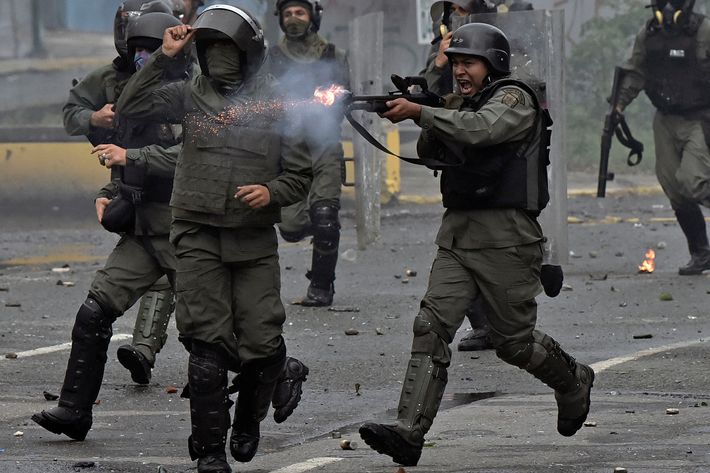
Nicholas Casey, the New York Times’ Andes bureau chief, was returning to Venezuela late last year after a trip to Mexico. Customs officials stopped him and told him that, this time, he wasn’t going to be allowed to pass through. Instead of returning to his apartment in Venezuela, he spent the night in the airport. Casey was put on a flight to Bogotá the next morning, and then sent back to New York. After about a year of reporting in Venezuela, just like that, he was banned.
Casey recently described his expulsion in the Times, along with the increasingly chaotic and dangerous situation in Venezuela that prompted it. President Nicolás Maduro, the anointed successor of Hugo Chávez, is trying to consolidate power as opposition protesters have taken to the streets in huge numbers. Those protests have turned violent. The country is in political crisis, but also economic crisis, with food and medicine shortages and dangerous hyperinflation. But there is plenty of room to think the situation might get worse as Maduro plans to hold a vote Sunday to form a Constituent Assembly, which will take control of the country to rewrite a new constitution. Casey explained to Daily Intelligencer what’s going on in inside Venezuela now, and why no one knows what will come after Sunday’s vote.
What led up to you being banned from Venezuela?
The government has created this narrative that Venezuela is facing problems because of a combination of greedy businessmen, who’ve been hoarding goods and causing shortages, and people like me in the media, who they say are trying to work as a propaganda arm of countries that want to overthrow the government. This Maduro government has become extremely authoritarian, blocking reporters from doing their work, ordering government-aligned gangs to smash reporters’ equipment, and in my case, actually blocking them from even being able to come to the country.
The crackdown on journalists is, of course, part of a larger economic and political crisis that’s been brewing in Venezuela for some time. How did the country get here?
This all started with the arrival of Hugo Chávez in 1999. Chávez came, promising big changes to Venezuela. Saying some things that nobody in Latin America was saying, where almost all the countries before Chávez were run by neoliberal governments criticized for having ignored large sectors of society: the poor, the peasants, the working class. Chávez said he would change that.
Venezuela is a petro state, which means most of its money and almost all of its exports come from oil. When oil prices go up, there’s lots of money, and when oil prices go down, there’s going to be a disaster. Chávez and the left didn’t do anything to change the economic model of Venezuela away from oil. They made so many of the state projects dependent on this oil money. But you also saw the positive effects of those state projects immediately. Education started to rise, health care got better, indicators on things from life expectancy to infant mortality started to improve quickly. You could see the effects of what Chávez was calling a socialist revolution.
And then?
But Venezuela ran into the perfect storm of problems when Chávez got cancer and died in 2013. He was a charismatic leader who was loved by large parts of the population. He had a lot of legitimacy, won elections — often quite easily. Shortly after he vanished from the scene, oil prices started to decline, which meant the economy was going into a tailspin in an even a worse way than it had during previous downward cycles. Because of how closely linked these social programs were to the price of oil, you suddenly start to see things disappearing from the shelves. Venezuela had been making so much money that it was actually not producing some basic goods — things like not having enough toilet paper. Certain crops were not being produced even though there’s plenty of fertile land.
Can you describe the effects of that economic crisis?
When you get up in the morning in Caracas, the first thing you see is people lining up for food. People spend large parts of their day going from line to line. You’ll get at the end of the line and into a store and find it may just have cooking oil, and you need bread. This is the economic reality in Venezuela. Is it getting better? No, it’s getting worse: Not just because these protests are causing massive economic shutdowns, but also because the state oil companies produce less and less every year and the left’s closed economic policies have been killing the larger economy. Venezuela used to be a wealthy country, and it’s sitting on reserves of oil which are thought to be even bigger than Saudi Arabia’s. There’s no reason there should be bread lines in this country.
In about 2016, all of the demons of an economic downturn start to hit at once: shortages, lines, inflation, and huge amounts of unemployment. Finally, this pressure that had been building started to explode out into the open with the protests.

And the protests have increasingly turned violent. Recent estimates have said at least 100 people have been killed.
We’re getting to the breaking point. The protesters are getting extremely angry and the government is getting extremely desperate to hold on. The National Guardsmen, who’ve been sent out to contain the protesters, have been firing tear-gas canisters directly into crowds. Tear gas, when it explodes in the canister, can kill you. Firing rubber bullets, sometimes when those are shot at close proximity, can kill you. There are increasingly brutal and cruel scenes of National Guardsmen severely beating protesters. From the side of the protesters, there’s looting, violence against the security forces, throwing Molotov cocktails, getting into open confrontation.
From what it sounds like, Maduro still has the support of the military and law enforcement. What are the primary constituencies of Maduro’s support — and his opposition?
The country is extremely divided. You’ve got a number of people who still believe in Hugo Chávez’s movement, and you’ve got a large number of people who want someone else in charge — that’s the opposition. The opposition, for the most part, is the old commercial interests of Venezuela and any politician who doesn’t align with the left. They’re interested in closer ties to the U.S., a more neoliberal economic framework, and to some degree, dismantling the achievements of Chávez. The Chavistas — the left — have a number of different players. There are people who don’t like Maduro, but did like Chávez. There are people who will follow Maduro anywhere. There is the military, which Chávez himself came out of and had a lot of control over, but to some degree, is an independent entity. There’s the National Guardsmen and police who’ve been sent out to guard the streets. The police, in particular, are people who are often quite poor and are suffering some of the exact same problems as the protesters but have so far stayed aligned to Maduro.
But one of the stranger moments this year was when this helicopter pilot who was part of the police — their equivalent of the FBI — got into a helicopter, flew it, and attacked the Supreme Court. He released a video of himself and a number of armed men in masks saying it’s time to rebel. So, this alliance Maduro has cobbled together could show signs of fraying. There are many people, even leftists, getting to the point where they think Venezuela needs to take a new tack.

Chávez seemed to have this cult of personality around him that Maduro lacks. How has that affected Maduro’s popularity?
Maduro is very, very different from Chávez. Chávez was very inspiring to people who followed him. People still cry at the mention of his death. It’s very common to talk to someone that will say they are Chavista, but not Madurista. Maduro often makes gaffes; he’s not charismatic. He’s gone on TV to have a salsa show, and he’s not a very good dancer. He’s tried to emulate Chávez — Chavez used to like to dance on TV — and that’s not been successful for him because he hasn’t ever really been himself. The biggest criticism is he’s been a bad carbon copy of the man who preceded him.
This is a backdrop to a big vote that Maduro has called on Sunday. Can you explain what this is, and why it’s so important?
Maduro wants to create a new body called a constituent assembly, which is not just going to rewrite the constitution — but they’re going to be allowed to rule the country until they produce a constitution. So, the long-term effect is there’s going to be a new constitution. The short-term effect is that Maduro is going to be establishing a new government that’s going to sit above all branches of government, could dismiss them, could dismantle them, could radically change how the country is run even before this new constitution is revealed. The most likely target of this group once it gets to power is Venezuela’s parliament, the National Assembly, which is controlled by the opposition.
The last time the constitution was rewritten, there was a vote to decide whether the process was even going to start. This time — and largely because the government is so unpopular — Venezuelans aren’t going to be asked, “Yes or no, do you want a new constitution?” The only question you’re going to be able to answer on Sunday is who you want to sit on this body that’s going to rewrite the constitution. Not surprisingly, there are no names from the opposition to choose from. It’s going to be entirely composed of people with very close ties to either Maduro or to his movement. Cilia Flores, who’s the wife of the president, is one of the delegates you could vote for.
Is there any chance that members of the constituent assembly might stand up to Maduro in the face of public opposition? Is there a chance they might at least defy Maduro’s worst impulses?
Here’s what’s interesting about this vote: When this group gets created, it will have even more power than the president. It’s been clear for a long time that Maduro isn’t popular among everybody on the left. So it’s entirely possible that this body could remove Maduro and put somebody else in charge of the country. It’s a total Pandora’s Box as to what happens next.
Interesting.
The other wild card is what the U.S. does. Donald Trump has said he’s going to impose big sanctions on Venezuela if it goes ahead with the vote. So far, the U.S. has just sanctioned individuals in Maduro’s government and those close to him as a means of threatening something bigger. It’s rumored in Washington that the American government could put restrictions on buying oil for American businesses. That could be a big disaster for Venezuela because the U.S. buys almost half of Venezuela’s oil.
What could the U.S. do to effectively deal with an increasingly tense situation?
There’s always a feeling in Washington of “what should we be doing to try to end this?” Even though Maduro is widely unpopular, his movement has a lot of people who are still behind it. There are not many other options, other than getting the two sides to negotiate. It’s going take Maduro’s government agreeing to sit down with people who don’t agree with him.
But it sounds, with this vote Sunday, that won’t be happening.
There’s no signs of it happening right now. What it looks like is Maduro doubling down and heading toward dictatorship instead.
That sounds like the worst-case scenario. How do you think that plays out?
People are starting to think about what it’s going to look like if Venezuela is run by a dictator. One thing that’s already happening is the opposition is threatening to form a parallel government. That’s an extremely dangerous move. If the other side decides to arm itself, you could have fighting — especially if there are two groups that consider themselves to be the government. We’re some distance from that, but these are the kinds of ideas that are starting to be thrown out around people who study Venezuela.
How is this political and economic crisis affecting the region, particularly with the respect of a potential humanitarian crisis should the situation get much worse?
All of Venezuela’s neighbors are looking at the situation with real fear. Last year, I wrote an article about people who had decided to take to the seas as refugees to Curaçao. They were getting in speed boats and going six or seven hours across the water, jumping into the water without life vests, and trying to sneak into the forest and start life there. A lot were professionals: Some were lawyers, people who had worked in the state oil companies, and a lot of people with higher degrees. They weren’t profiles of people you normally think of trying to leave for economic reasons — except basically everybody needs to leave for economic reasons in this conflict. If this conflict went from just being a political one to an armed one, you could see larger waves of people leaving. I think that’s what’s most scary for neighboring countries, which are not prepared to deal with large movements of people.
Is there any reason to be optimistic that Venezuela can come through this crisis? What’s the best-case scenario right now?
We’re reaching the point of no return with this vote on Sunday because it eliminates negotiation. The best-case scenario for both the opposition and the left would be if the vote this Sunday were canceled and Maduro would agree to hold talks with the opposition, and to hold an early election for the National Assembly, and later, for the presidency. So Venezuelans could vote and decide themselves who they want to be in charge. But it’s not a happy ending if that happens because the economy is just as much a disaster and the food lines are going to be just as long the day after the new government would take charge. That would begin the next stage, the long reconstruction — but we can’t get to that stage until the opposition and the left are able to come to an agreement on how the country gets governed. And that’s looking increasingly unlikely now.
This interview has been edited and condensed.





























